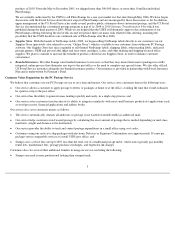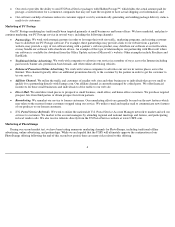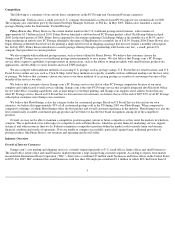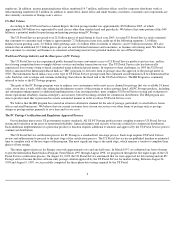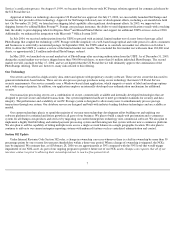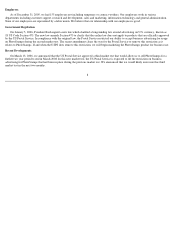Stamps.com 2005 Annual Report Download - page 16
Download and view the complete annual report
Please find page 16 of the 2005 Stamps.com annual report below. You can navigate through the pages in the report by either clicking on the pages listed below, or by using the keyword search tool below to find specific information within the annual report.
We could face competitive pressures from new technologies or the expansion of existing technologies approved for use by the US Postal
Service. We may also face competition from a number of indirect competitors that specialize in electronic commerce and other companies with
substantial customer bases in the computer and other technical fields. Additionally, companies that control access to transactions through a
network or Web browsers could also promote our competitors or charge us a substantial fee for inclusion. In addition, changes in postal
regulations could adversely affect our service and significantly impact our competitive position. We may be unable to compete successfully
against current and future competitors, and the competitive pressures we face could seriously harm our business.
If we do not respond effectively to technological change, our services and products could become obsolete and our business will suffer.
The development of our services, products and other technology entails significant technical and business risks. To remain competitive, we
must continue to enhance and improve the responsiveness, functionality and features of our online operations. The Internet and the electronic
commerce industry are characterized by rapid technological change; changes in user and customer requirements and preferences; frequent new
product and service introductions embodying new technologies; and the emergence of new industry standards and practices.
The evolving nature of the Internet or the postage markets could render our existing technology and systems obsolete. Our success will
depend, in part, on our ability to license or acquire leading technologies useful in our business; enhance our existing services; develop new
services or features and technology that address the increasingly sophisticated and varied needs of our current and prospective users; and
respond to technological advances and emerging industry and regulatory standards and practices in a cost-effective and timely manner.
Future advances in technology may not be beneficial to, or compatible with, our business. Furthermore, we may not be successful in using
new technologies effectively or adapting our technology and systems to user requirements or emerging industry standards on a timely basis.
Our ability to remain technologically competitive may require substantial expenditures and lead time. If we are unable to adapt in a timely
manner to changing market conditions or user requirements, our business, financial condition and results of operations could be seriously
harmed.
Our operating results could be impaired if we or the Internet become subject to additional government regulation and legal uncertainties.
Due to the increasing popularity and use of the Internet, it is possible that a number of laws and regulations may be adopted with respect to
the Internet, relating to user privacy, pricing, content, copyrights, distribution, characteristics and quality of products and services, and export
controls.
The adoption of any additional laws or regulations may hinder the expansion of the Internet. A decline in the growth of the Internet could
decrease demand for our products and services and increase our cost of doing business. Moreover, the applicability of existing laws to the
Internet is uncertain with regard to many issues, including property ownership, export of specialized technology, sales tax, libel and personal
privacy. Our business, financial condition and results of operations could be seriously harmed by any new legislation or regulation. The
application of laws and regulations from jurisdictions whose laws do not currently apply to our business, or the application of existing laws and
regulations to the Internet and other online services could also harm our business.
We have employees and offer our services in multiple states, and we may in the future expand internationally. These jurisdictions may
claim that we are required to qualify to do business as a foreign corporation in each state or foreign country. Our failure to qualify as a foreign
corporation in a jurisdiction where we are required to do so could subject us to taxes and penalties. Other states and foreign countries may also
attempt to regulate our services or prosecute us for violations of their laws. Further, we might unintentionally violate the laws of foreign
jurisdictions and those laws may be modified and new laws may be enacted in the future.
Risks Related to Our Stock
Changes in stock option accounting rules will have an adverse affect on our operating results.
We use options to acquire our common stock to attract, incentivize and retain our employees in a competitive marketplace. Statement of
Financial Accounting Standards (SFAS) No. 123, “Accounting for Stock-Based Compensation,” allowed companies the choice of either using
a fair value method of accounting for options that would result in expense recognition for all options granted, or using an intrinsic value
method, as prescribed by
13


